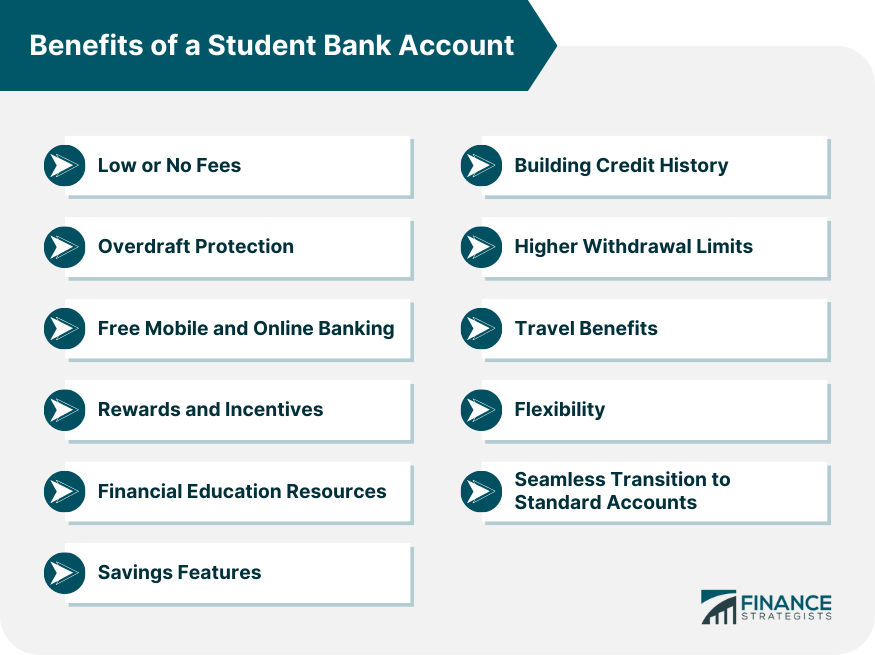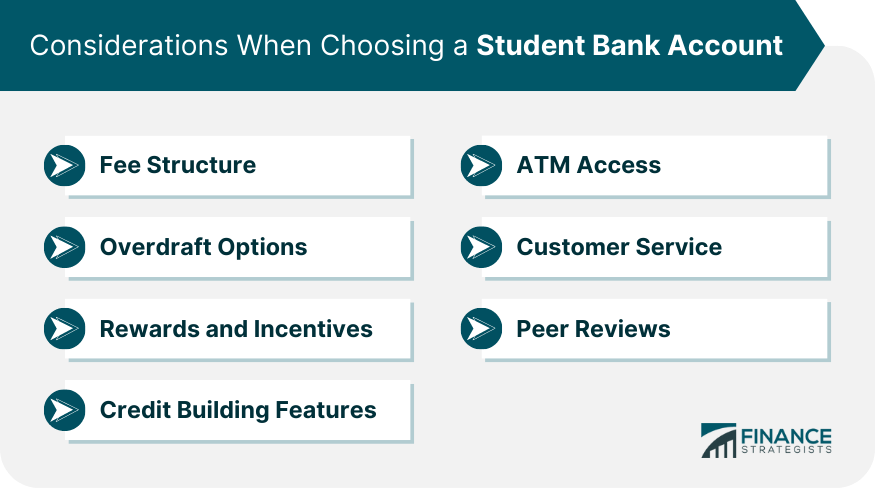A student bank account is like a special helper for students who are studying in colleges or universities. It's designed keeping in mind all the things students usually need when it comes to handling money. For students to get this account, they usually have to show they are enrolled in a school, like a college or a university. Once they have this account, they get access to many helpful features. These might include lower fees, special offers, or tools that make banking simpler. The main idea behind these accounts is to help students manage their money more easily while they're studying. Beyond just being a place to store and manage money, these accounts are also like mini teachers. They come with tools and resources to teach students about managing money. By using them, students not only keep their money safe but also learn useful money lessons. These lessons are important and will help them a lot when they finish school and step into the bigger world. Student bank accounts offer numerous benefits designed specifically for students, taking into consideration their unique financial situation and needs during their academic years. Here are the main benefits: Institutions recognize that students, often living on limited funds, need all the savings they can get. To support this, many student accounts either drastically reduce or completely remove standard banking fees. For instance, while a regular bank account might charge a monthly maintenance fee, many student accounts do not. Similarly, other transactional costs, like ATM fees or transfer charges, are frequently lower for student accounts compared to their standard counterparts. College life can be unpredictable, and there might be times when students unintentionally spend more than what's in their account. Banks acknowledge this reality and thus offer enhanced overdraft protection for student accounts. This protection can manifest in several ways – reduced fees for going into overdraft, a grace period to restore the balance without penalty, or even periods where the overdraft incurs no interest. Such measures provide a safety net for students, ensuring a minor miscalculation doesn't result in a major financial setback. In today's digital age, convenience is key. Recognizing this, banks ensure that students can effortlessly access and manage their accounts through mobile apps and online platforms. Whether it's checking account balances, making transfers, scheduling payments, or even setting savings goals, these platforms provide comprehensive services. Moreover, for students who are often on the go – moving between campuses, traveling home, or embarking on study abroad journeys – this 24/7 digital access becomes indispensable. To distinguish their student offerings and make them more enticing, many banks roll out unique rewards and incentives. These perks vary widely but are often tailored to student lifestyles. For instance, they might receive cash back on textbook purchases, discounts at local eateries, or even complimentary subscriptions to academic resources or entertainment platforms. Such incentives add tangible value to the account, ensuring students get more than just a place to store their money. Transitioning to independence, many students grapple with personal finance for the first time. To ease this process, banks offer a plethora of educational resources. These might be in-depth articles explaining credit scores, interactive budgeting tools, video tutorials on investing basics, or even in-person workshops addressing diverse financial topics. Through these resources, banks aim to equip students with the knowledge to make informed financial decisions both during their college years and beyond. Instilling a habit of saving early on is crucial. To promote this, some student bank accounts come packed with innovative saving tools. One popular feature is the round-up tool, where transactions are rounded up to the nearest dollar, and the difference is funneled into savings. Over time, these small amounts can accumulate, providing students with a pleasant financial surprise. A positive credit history is the cornerstone of future financial endeavors, be it securing a mortgage, financing a car, or even obtaining a premium credit card. With student bank accounts, young adults get an early start. By demonstrating responsible financial behavior, like not overdrafting frequently and managing their funds wisely, they begin building a favorable credit history that will benefit them in countless ways in the future. There are times in a student's life, like the beginning of a semester, when large expenses become inevitable. Banks are attuned to these patterns and often provide higher ATM withdrawal limits during such periods. This ensures that students can readily access their funds when they need them most, without facing unnecessary constraints. With students increasingly traveling – for holidays, semesters abroad, or international programs – having a bank account that supports their adventures is crucial. Many student accounts come packed with travel-centric benefits. This might mean no foreign transaction fees when shopping abroad, complimentary travel insurance coverage, or exclusive discounts and deals with popular airlines and lodging options. No two students have the exact same financial situation. Banks understand this diversity and thus infuse a degree of flexibility into their student accounts. This might mean no minimum balance requirements, allowing occasional leniency on fees, or even offering customized account features based on the student's financial behavior. Eventually, students graduate and move into the next phase of their lives. Banks smooth this transition by providing an easy process to upgrade from a student account to a standard one. This continuity not only maintains the existing financial relationship but often comes with added benefits, ensuring that the individual continues to receive value from their banking relationship. Picking a bank account as a student can be tricky. With so many options out there, how do you find the best one? It's not just about a place to keep your money. It's about finding a bank that gets what student life is like. From paying for books to saving up for fun outings, your bank should be there to help. To make things simpler, here's a list of things to think about when choosing your student bank account. Fee Structure: Assess any monthly fees, transaction charges, and other costs associated with the account. Overdraft Options: Look at the terms for overdraft protection, any fees involved, and whether there's an interest-free period. Rewards and Incentives: Check for special bonuses, cashback, or discounts tailored for students. Credit Building Features: Determine if the account can help you establish or improve credit history. ATM Access: Consider the availability and location of the bank's ATMs, especially fee-free ones. Customer Service: Ensure the bank provides reliable customer support, especially during crucial times like exams when you might need assistance outside regular hours. Peer Reviews: Read reviews from fellow students or recent graduates about their experiences with the bank. By weighing these considerations, students can find an account that not only manages their finances but also supports their broader life and academic goals. A student bank account is an essential financial tool tailored to meet the unique needs of those in higher education. These accounts simplify the monetary management for students, catering to their specific spending patterns - from daily expenses to larger academic costs. Notably, these accounts come with perks such as reduced fees, robust overdraft protection, and digital banking facilities. They also go the extra mile in offering rewards, fostering financial literacy, assisting in early credit history establishment, and more. These benefits ensure that students are not only equipped to handle their current finances but are also prepared for the future. When selecting a student bank account, considerations like fee structures, rewards, credit-building features, and customer service are paramount. The right student bank account can provide invaluable support throughout one's academic journey and beyond.What Is a Student Bank Account?
Benefits of a Student Bank Account
Low or No Fees
Overdraft Protection
Free Mobile and Online Banking
Rewards and Incentives
Financial Education Resources
Savings Features
Building Credit History
Higher Withdrawal Limits
Travel Benefits
Flexibility
Seamless Transition to Standard Accounts

Considerations When Choosing a Student Bank Account

Conclusion
Benefits of a Student Bank Account FAQs
A student bank account is a specialized banking service designed for students enrolled in colleges or universities. It offers tailored benefits like lower or no fees, enhanced overdraft protection, and student-specific rewards.
These features, like the round-up tool, promote savings habits by automatically rounding up transactions and saving the difference. Over time, this can lead to substantial savings, easing financial strain.
Student bank accounts offer opportunities for young adults to demonstrate responsible financial behavior, like managing overdrafts and funds wisely. This, in turn, helps in building a favorable credit history which is vital for future financial endeavors.
Yes, many student bank accounts offer travel-centric benefits such as no foreign transaction fees, complimentary travel insurance, and exclusive deals with airlines and lodging, catering to students who travel for studies or leisure.
Flexibility in student bank accounts means features like no minimum balance requirements or occasional fee leniency. Such features acknowledge the diverse financial situations of students, offering a more customized banking experience.
True Tamplin is a published author, public speaker, CEO of UpDigital, and founder of Finance Strategists.
True is a Certified Educator in Personal Finance (CEPF®), author of The Handy Financial Ratios Guide, a member of the Society for Advancing Business Editing and Writing, contributes to his financial education site, Finance Strategists, and has spoken to various financial communities such as the CFA Institute, as well as university students like his Alma mater, Biola University, where he received a bachelor of science in business and data analytics.
To learn more about True, visit his personal website or view his author profiles on Amazon, Nasdaq and Forbes.











